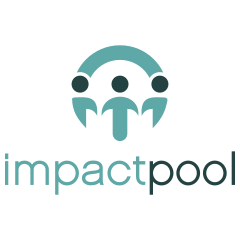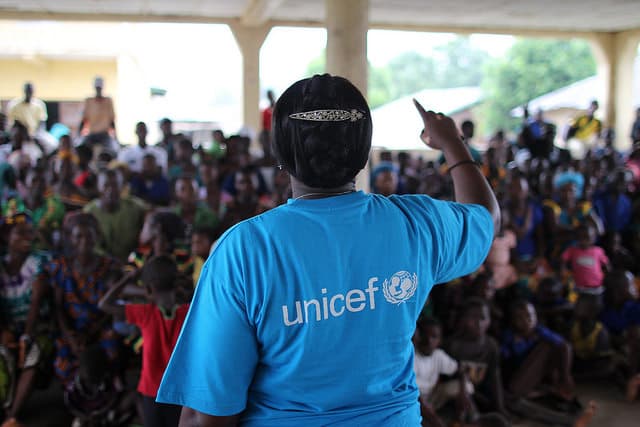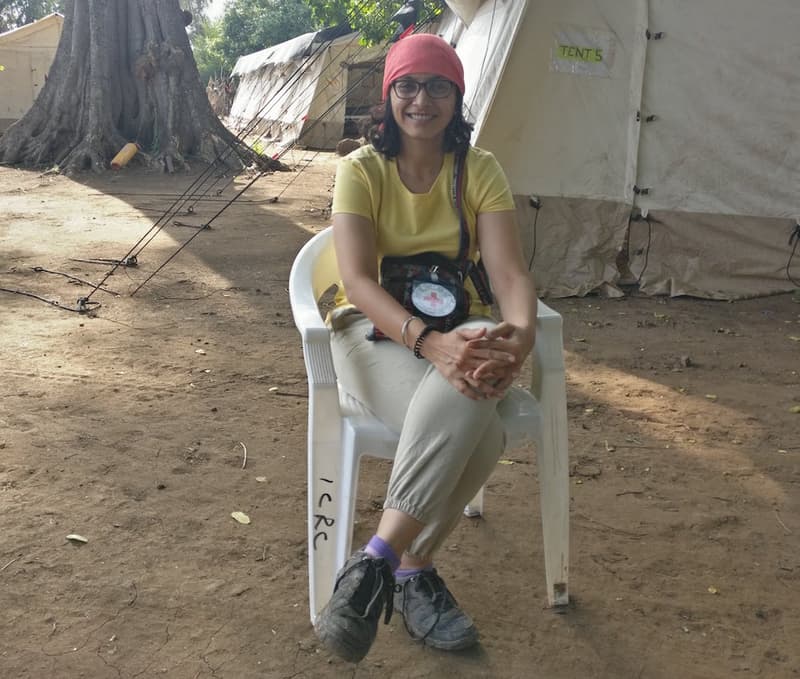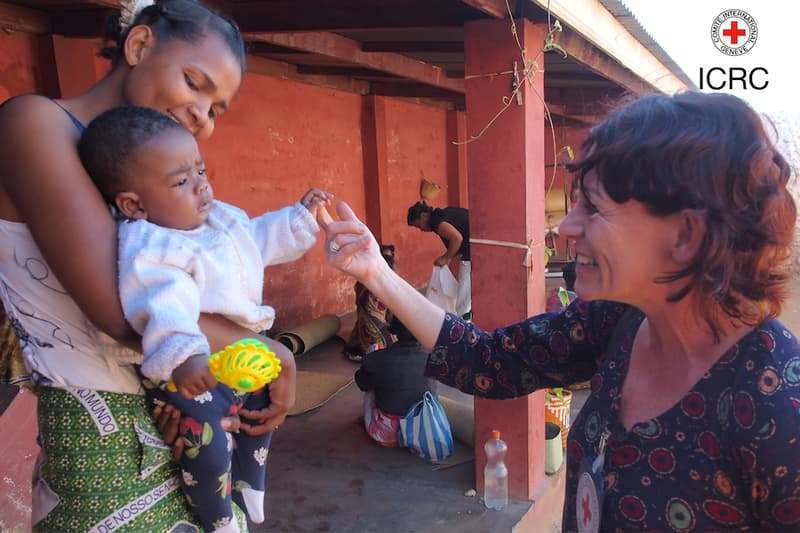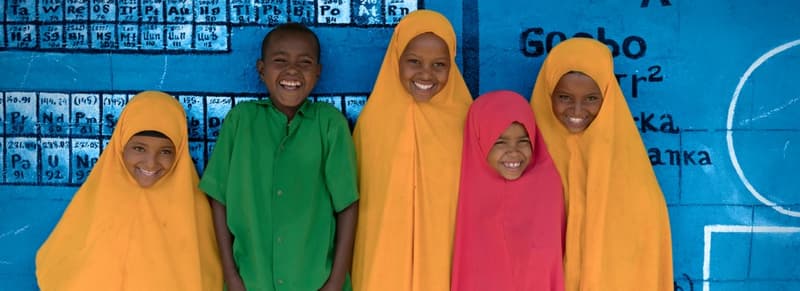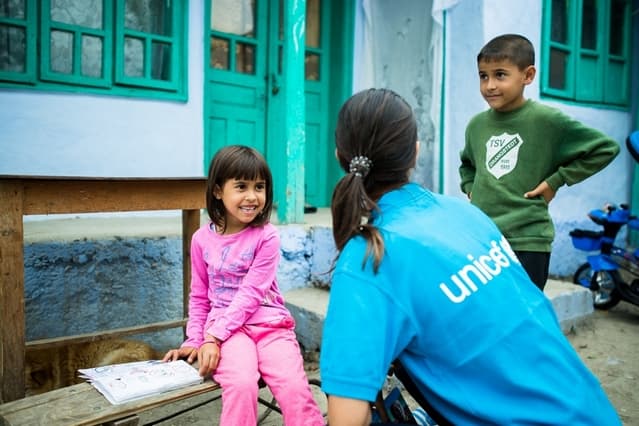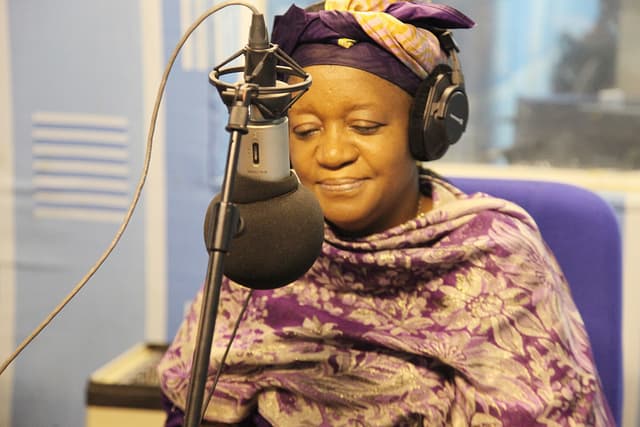Chief Education, P5, Fixed Term Appointment, New Delhi, South Asia Region (SAR), Post Number 2606 (Vacancy for Non-Indian Nationals Only)
New Delhi
- Organization: UNICEF - United Nations Children’s Fund
- Location: New Delhi
- Grade: Senior level - P-5, International Professional - Internationally recruited position
-
Occupational Groups:
- Education, Learning and Training
- Managerial positions
- Closing Date: 2023-12-05
Under the overall guidance of the Deputy Representative, the Chief, Education is accountable for the development, design, planning, implementation, and management of the Education programme within the country programme.
UNICEF works in some of the world’s toughest places, to reach the world’s most disadvantaged children. To save their lives. To defend their rights. To help them fulfill their potential.
Across 190 countries and territories, we work for every child, everywhere, every day, to build a better world for everyone.
And we never give up.
For every child, AN ADVOCATE
The fundamental mission of UNICEF is to promote the rights of every child, everywhere, in everything the organization does — in programs, in advocacy and in operations. The equity strategy, emphasizing the most disadvantaged and excluded children and families, translates this commitment to children’s rights into action. For UNICEF, equity means that all children have an opportunity to survive, develop and reach their full potential, without discrimination, bias or favoritism. To the degree that any child has an unequal chance in life — in its social, political, economic, civic and cultural dimensions — her or his rights are violated. There is growing evidence that investing in the health, education and protection of a society’s most disadvantaged citizens — addressing inequity — not only will give all children the opportunity to fulfill their potential but also will lead to sustained growth and stability of countries. This is why the focus on equity is so vital. It accelerates progress towards realizing the human rights of all children, which is the universal mandate of UNICEF, as outlined by the Convention on the Rights of the Child, while also supporting the equitable development of nations.
UNICEF India Country Office (ICO) works in close collaboration with government and other partners to achieve results for children including adolescents and continue to address bottlenecks compounding the inequities in educational access and learning with a continuous influence on shaping policy and practice. The key interventions and change strategies across the education programmatic areas will be enhanced data analysis to inform system strengthening and improve education service delivery, mainstreaming gender transformation, children with disabilities and climate change environmental sustainability across the education system, digital transformation in teaching and learning and leveraging partnerships and convergence, on both demand and supply side of the education ecosystem.
How can you make a difference?
Under the overall guidance of the Deputy Representative, the Chief, Education is accountable for the development, design, planning, implementation, and management of the Education programme within the country programme. As Head of Section, s/he leads a group of professional and support staff to develop and manage the education programme in collaboration with other programme sectors, and with government and key development partners. S/he is accountable for the overall quality of the programme design and for ensuring that it is effectively and efficiently managed and monitored.
The Chief is responsible for managing and leading all stages of education programmes/projects from strategic planning and formulation to delivery of results on strengthening national education systems to improve learning outcomes, universal access to equitable and inclusive primary/early childhood education, and renewing involvement in secondary education, especially for children who are marginalized, disadvantaged and excluded in society.
The Chief is responsible for leading, managing and establishing the plans of action to ensure the achievement of concrete and sustainable programme/project results, according to plans, allocation, results based-management approaches and methodology (RBM) and UNICEF’s Strategic Plans, standards of performance and accountability framework.
Summary of key functions/accountabilities:
- Managerial leadership
- Programme development and planning
- Programme management, monitoring and quality control of results
- Advisory services and technical support
- Advocacy, networking and partnership building
- Innovation, knowledge management and capacity building
1. Managerial leadership
- Establish the section’s annual work plan with the education team and set priorities and targets. Monitor work progress and ensure results are achieved according to schedule and performance standards.
- Establish clear individual performance objectives, goals and timelines; and provide timely guidance to enable the team to perform their duties responsibly and efficiently. Plan and ensure timely performance management and assessment of the team.
- Supervise team members by providing them with clear objectives, goals, direction, and guidance to enable them to perform their duties responsibly, effectively and efficiently.
2. Programme development and planning
- Lead the planning and updating of the situation analysis to ensure that current and comprehensive data is available to guide UNICEF’s strategic policy advocacy, intervention and development efforts on education programmes and to set programme priorities, strategies, and implementation plans.
- Keep abreast of national, regional and international development priorities on education to leverage UNICEF’s position and competencies with donors, national governments, communities and constituents to advocate and promote education initiatives and policies.
- Lead, coordinate and supervise the development of education programmes/projects (as a full component of the CO and/or UNSDF programmes). Establish plans of action, programme goals and results, using results-based planning methodology and terminology (RBM).
- Oversee the timely preparation of programme recommendation and related documentation for inclusion in the Country Office Programme recommendation, ensuring alignment with UNICEF’s overall Strategic Plans, regional strategies and national priorities, plans and competencies.
- Collaborate with colleagues and partners to develop partnership frameworks to address specific needs and to leverage resources for enhancing education programmes/projects. Ensure synergy, integration, coherence, and harmonization of programmes and projects with UNICEF Strategic Plans and priorities, donors’ development strategies and policies, national priorities, and UN System development interventions and initiatives.
3. Programme management, monitoring and quality control of results
- Plan and collaborate on monitoring and evaluation initiatives to establish benchmarks, performance indicators and other UNICEF/UN system indicators, to assess and strengthen performance accountability, coherence and delivery of concrete and sustainable results on education programmes.
- Participate in major monitoring and evaluation exercises, programme reviews and annual reviews with government and other counterparts to assess progress and to engage stakeholders to take required action and interventions to achieve results.
- Prepare and assess monitoring and evaluation reports to identify gaps, strengths, and/or weaknesses in programme and management; identify lessons learned and use knowledge gained for development planning and timely intervention to achieve goals.
- Monitor programmes and projects to assess progress, identify bottlenecks and potential problems and take timely decisions to resolve issues and/or refer to relevant officials for timely resolution.
- Plan, approve, monitor, certify, and control the use of programme resources (financial, human, administrative and other assets) certifying & verifying compliance with organizational rules, regulations and procedures, donor commitments and standards of accountability and integrity. Ensure timely reporting and liquidation of resources.
- Prepare and submit programme and project reports to donors and other partners to keep them informed on programme progress and critical issues.
4. Advisory services and technical support
- Provide technical advice to key government officials, NGO, UN system and other country office partners on strategies and best practices to influence approaches and policies, and to support social, economic, political, and legal development planning, implementation and delivery of results on education programmes and related issues.
- Coordinate and ensure the availability of technical experts (with Regional Office/HQ) to ensure timely support throughout all stages of programming and project implementation.
- Participate in strategic discussions to influence policy and agenda setting for combating all forms of discrimination against children by advising on and advocating strategies and approaches to promote universal access to equitable and inclusive education for children in the country.
5. Advocacy, networking and partnership building
- Build and strengthen strategic partnerships through networking and advocacy with local and national governments, UN system agency partners, donors, internationally recognized institutions, NGOs, funding organizations, research institutes and private sector to reinforce cooperation and/or pursue opportunities, leverage funds, to promote goals and achieve sustainable and broad results on education programmes.
- Design communication strategies, implementation plans and activities for maximum communication impact and outreach to promote awareness, establish partnerships for sustainable results, and to support fund raising for UNICEF and Country Office programmes on education.
- Participate and/or represent UNICEF in inter-agency (UNCT) discussions and planning on education and related issues to ensure organizational position, interests and priorities are fully considered and integrated in the UNSDF development planning and agenda setting process. Collaborate with inter-agency partners and colleagues on the UNSDF planning and preparation of programmes/projects including emergency preparedness.
6. Innovation, knowledge management and capacity building
- Promote critical thinking, innovative approaches and good practices for sustainable education programming initiatives through advocacy and technical advisory services.
- Keep abreast, research, benchmark, introduce and implement best and cutting-edge practices on education and management. Institutionalize and disseminate best practices and knowledge learned.
- Lead the development of policies and procedures and introduce innovation and best practices to ensure optimum efficiency and efficacy of sustainable programmes and projects.
- Lead, plan and implement capacity building initiatives to enhance the competencies of stakeholders to promote sustainable results on education and related programmes/projects.
To qualify as an advocate for every child you will have…
Education:
- An advanced university degree in one of the following fields is required: education, economics, psychology, sociology or another relevant technical field.
Experience:
- A minimum of ten years of professional experience in programme planning, management, and/or research in education at the international level is required.
- Experience in managing medium and large sized programmes and teams, is required.
- Experience in high-level engagement and partnerships with Government and donors is an asset.
- Relevant experience in a UN system agency or organization is considered as an asset.
- Familiarity/ background with emergency is considered as an asset.
Language Requirements:
- Fluency in English is required. Knowledge of another official UN language (Arabic, Chinese, French, Russian or Spanish) is an asset.
For every Child, you demonstrate...
UNICEF’s Core Values of Care, Respect, Integrity, Trust and Accountability and Sustainability (CRITAS) underpin everything we do and how we do it. Get acquainted with Our Values Charter: UNICEF Values
UNICEF competencies required for this post are…
- Nurtures, Leads and Manages People (2)
- Demonstrates Self Awareness and Ethical Awareness (2)
- Works Collaboratively with others (2)
- Builds and Maintains Partnerships (2)
- Innovates and Embraces Change (2)
- Thinks and Acts Strategically (2)
- Drives to achieve impactful results (2)
- Manages ambiguity and complexity (2)
During the recruitment process, we test candidates following the competency framework. Familiarize yourself with our competency framework and its different levels: competency framework here.
UNICEF is here to serve the world’s most disadvantaged children and our global workforce must reflect the diversity of those children. The UNICEF family is committed to include everyone, irrespective of their race/ethnicity, age, disability, gender identity, sexual orientation, religion, nationality, socio-economic background, or any other personal characteristic.
We offer a wide range of benefits to our staff, including paid parental leave, breastfeeding breaks and reasonable accommodation for persons with disabilities. UNICEF strongly encourages the use of flexible working arrangements.
UNICEF has a zero-tolerance policy on conduct that is incompatible with the aims and objectives of the United Nations and UNICEF, including sexual exploitation and abuse, sexual harassment, abuse of authority and discrimination. UNICEF is committed to promote the protection and safeguarding of all children. All selected candidates will, therefore, undergo rigorous reference and background checks, and will be expected to adhere to these standards and principles. Background checks will include the verification of academic credential(s) and employment history. Selected candidates may be required to provide additional information to conduct a background check.
Remarks:
- The vacancy is open to internal and external candidates. As per the UNICEF Staff Selection Policy, the definition of “internal” is only applicable to UNICEF staff members holding a permanent, continuing or FT appointment.
- This position is open to Non-Indian Nationals only.
- Mobility is a condition of international professional employment with UNICEF and an underlying premise of the international civil service. Only shortlisted candidates will be contacted and advance to the next stage of the selection process.
- UNICEF appointments are subject to medical clearance. Issuance of a visa by the host country of the duty station, which will be facilitated by UNICEF, is required for IP positions. Appointments may also be subject to inoculation (vaccination) requirements, including against SARS-CoV-2 (COVID). UNICEF reserves the right to withdraw an offer of appointment, without compensation, if a visa or medical clearance is not obtained, or necessary inoculation requirements are not met, within a reasonable period for any reason.
- UNICEF only considers higher educational qualifications obtained from an institution accredited / recognized in the World Higher Education Database (WHED), a list updated by the International Association of Universities (IAU) / United Nations Educational, Scientific and Cultural Organization (UNESCO). The list can be accessed at http://www.whed.net/.

